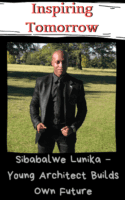Dr Rachel Fanelwa Ngece-Ajayi is a scientist and senior Physical Chemistry lecturer at the University of the Western Cape (UWC) who is taking science and technology to Khayelitsha through AmaQawe, an NGO that wants to encourage the love of Mathematics and Science in learners.
AmaQawe wants to encourage more learners to take up Mathematics and Science at varsity level and not be discouraged or see these subjects as unconquerable burdens.
“AmaQawe ngeMfundo aspires to inspire, encourage and motivate learners in schools in marginalised communities to study Science, Technology, Engineering and Mathematics (STEM) subjects and eventually work towards STEM careers post matric,” says Dr Fanelwa.
“This organisation strives to promote STEM in these areas and remove the notion that STEM is difficult and that learners from these communities are unable to become scientists.”
“AmaQawe ngeMfundo achieves this through fun and interactive workshops, seminars and fairs where speakers from different STEM backgrounds are invited to inspire learners while educating them.”
“Through our make-shift mobile laboratory, we excite and expose learners to different aspects of STEM through fun and interactive experiments.”
The NGO helps learners see how science can fit into their everyday lives.
“We ensure that the learners are taught STEM-related exciting topics which are linked to experimental work at the end of the workshop or seminar. One such seminar was hosted on 2 September where the topic was Science of Cosmetics, where women in STEM were invited to speak to an all-girl audience.”
“We are about fun and interaction, so we keep them busy and entertained by offering gifts for participation. Whenever there is an event, we ensure that the learners spend time with the invited guests to gain advice. We also provide them with assistance with applications into institutions of higher learning.”
Having been born-and-bred in Site C, Khayelitsha, Dr Fanelwa made money to help her and her mother, which also helped put her through school. She never lost hope, always knowing there was more to her life than her current situation.
“I did hair on weekends because my mom was often not well, and she worked seven days a week. She had to find extra work to ensure that we were able to eat and go to school.”
“I stayed motivated because I wanted to get educated and to make something of my life. I was encouraged by my mother to stay focused and ensure that my goal of completing school was achieved. She also reminded me that she did not want me to become a domestic worker like her, but to rather strive for better.”
After completing her high school education at South Peninsula High School, Dr Fanelwa obtained a NSFAS student loan and studied a Bachelor of Sciences at UWC, completing her Honours, Masters and PhD shortly after.
She explains that she attended South Peninsula High School, which is outside of Site C, because her mother wanted to ensure that she could accompany her children to and from school as she was worried about their safety.
“I am thankful for her decision to do that because I was taught and inspired by some of the teachers, and told that through hard work anything is impossible. My mother found it very difficult to pay for my fees and transportation and as such I had to continue doing my domestic work jobs to supplement her salary.”
Dr Fanelwa specialises in Physical and Electrochemistry and has many achievements under her belt. She is particularly interested in the development of nanbiosensors for the detection of HIV/Aids and TB treatment drugs.
“Some of my achievements include the fact I was able to successfully complete my PhD studies while working. I have visited as a Visiting Professor at the University of Missouri-Columbia Campus, USA and at the University of Cergy Pontoise in France. Additionally, I am the recipient of many travel and research grants including the National Research Foundation Thuthuka Grant as well as a grant from the Water Research Commission.”
Due to a lack of funding, AmaQawe has only been able to reach three schools in the Khayelitsha area, but hopes to expand and help more learners find their niche in the sciences. They have found that some learners from other schools do attend their workshops and seminars.
“AmaQawe is in great need for funding which is why we are limited to Khayelisha in terms of our work.”
If anyone wants to get involved with AmaQawe or make any donations to the cause, you can get in contact with them or Dr Fanelwa directly on Twitter: @FanelwaA, Facebook: AmaQawe ngeMfundo or Instagram: amaqawe.ngemfundo. You can also visit their website here.
Be inspired by Dr Fanelwa who proves that, it doesn’t matter where someone stems from, anyone can be great with a little hard work and motivation!






